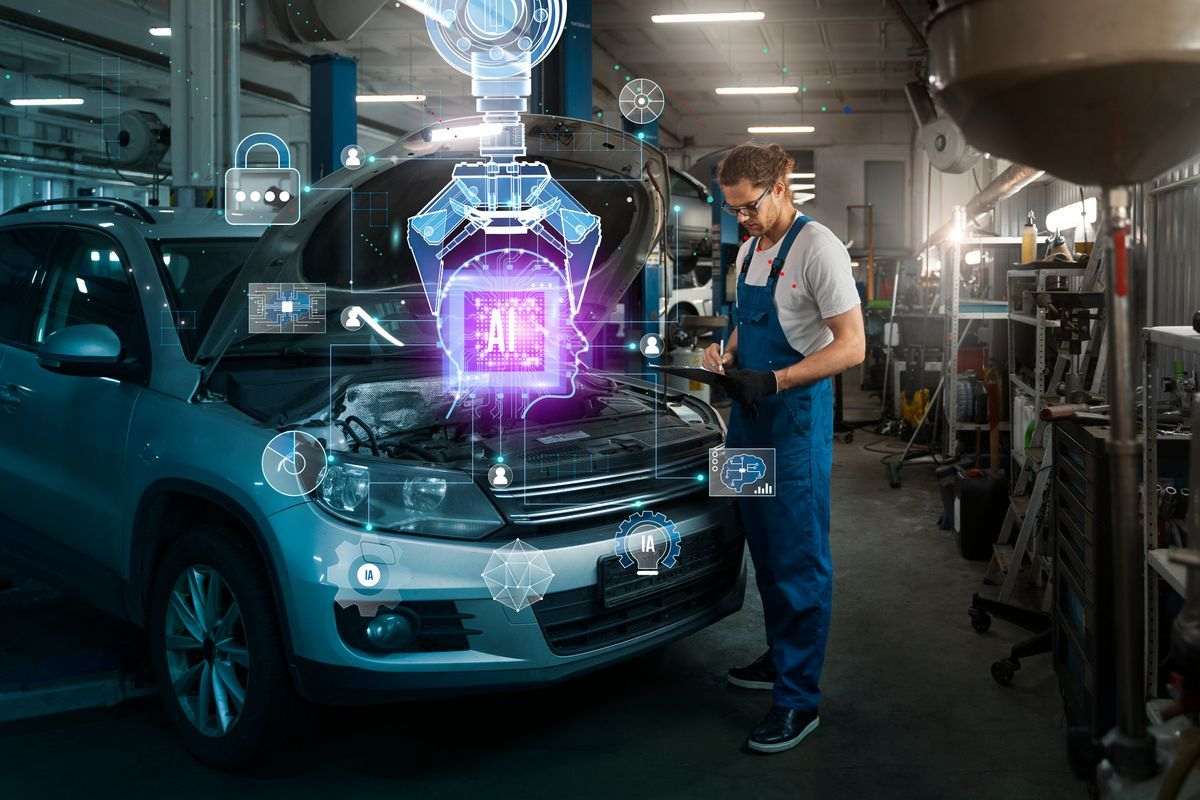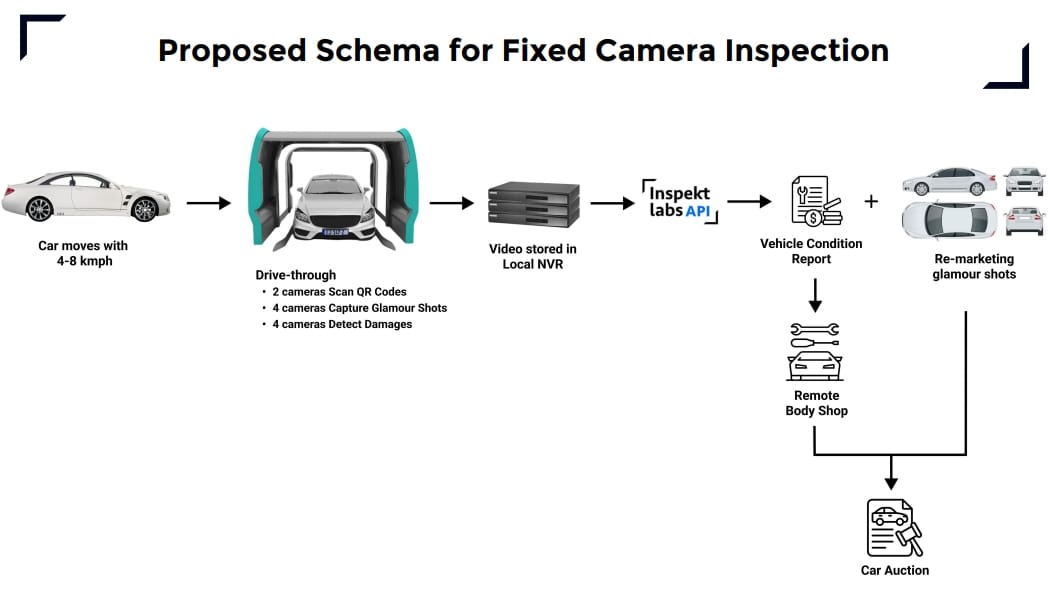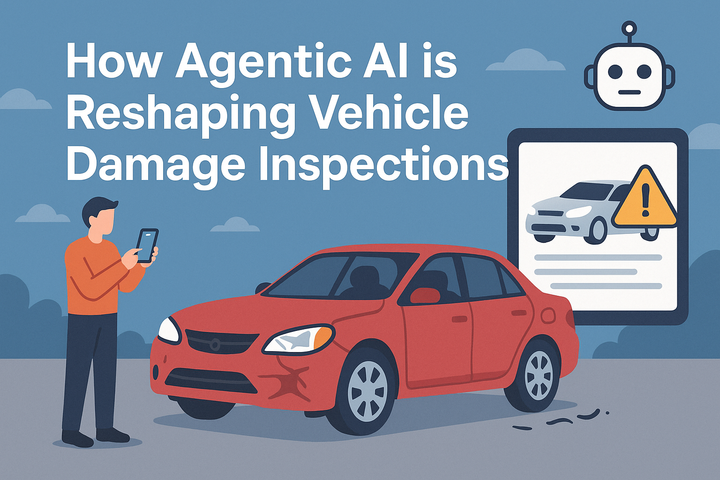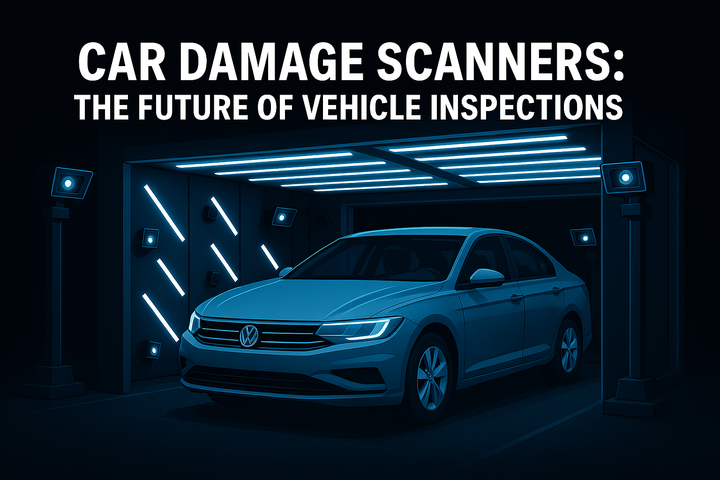AI Powered Inspection Scanners (or Fixed Cameras) for Vehicle inspections

Car inspections play an important role in the automotive industry, serving as a cornerstone for numerous businesses and auction companies that depend on them for their operational success.
Traditional vehicle inspections, burdened by manual labor and subject to human errors, often lead to time-consuming processes that hinder efficiency and accuracy in the fast-paced environment of car auctions.
This is where AI-based camera inspection comes into play, revolutionizing the inspection process by enhancing speed, precision, and reliability, ultimately reshaping the landscape of vehicle evaluation.
Two Approaches to Car Inspections: Centralized vs. Decentralized
Car inspections can be categorized into two main methods: Centralized, also known as Fixed Camera (or Scanner) Inspections, and Decentralized, which is commonly referred to as Smartphone-Based Inspections.
Both methodologies aim to generate accurate and reliable vehicle condition reports, catering to the diverse needs of businesses operating in this dynamic sector.
Fixed Camera Inspections
Centralized or Fixed Camera Inspection is a revolutionary approach to vehicle evaluations that leverages strategically placed cameras to streamline the inspection process. Unlike traditional manual methods, this innovative technique uses advanced technology, reducing the need for labor-intensive and time-consuming procedures.
When is Fixed Camera (or Scanner) Inspection Needed?
Fixed Camera Inspection is essential in situations where rapid and precise evaluations are of utmost importance, including:
- Auction houses dealing with a large number of vehicles require a faster and more efficient inspection process to maintain the pace of operations.
- For businesses aiming to expedite the buying and selling process, fixed camera inspections offer a rapid and reliable alternative to traditional methods.
- In scenarios where human errors can lead to significant consequences, the automation and objectivity of fixed camera inspections mitigate the risk of inaccuracies.

Decentralized (or Smartphone-Based) Inspections
Decentralized or Smartphone-Based Inspections represent a modern approach to vehicle evaluations, where end-users leverage their smartphones to capture images for inspection. This method offers flexibility and accessibility, allowing users to conduct inspections from any location.
When is Smartphone-Based Inspection Preferred?
Smartphone-Based Inspections are advantageous in various scenarios:
- Ideal for scenarios where physically bringing a vehicle to a fixed location is impractical or challenging.
- Users are not constrained by business hours or availability, conducting inspections at their convenience.
Learn more about How Centralized (or Fixed Camera) and Decentralized (or Smartphone-Based) Frameworks Enhance Vehicle Inspections
Implementing Fixed Camera Inspection at the Auction House
Let's dive into the set-up, process, and workflow:

Drive-Through Setup:
- Vehicles navigate a simple drive-through at a controlled speed of 4-8 kmph.
- The drive-through setup ensures a consistent and regulated environment for inspection.
Camera Distribution:
- Two cameras are dedicated to capturing QR codes for check-in and check-out, facilitating an easy entry and exit process.
- Four cameras focus on capturing high-resolution glamor shots, enhancing the vehicle's presentation for remarketing purposes.
- The remaining four cameras are strategically positioned to identify damages with precision.
Video Recording:
- As the vehicle moves through the drive-through, an 18-second video is recorded by the fixed cameras.
- This video serves as a comprehensive visual record of the vehicle's condition during the inspection process.
Data Storage:
- The recorded videos are stored in a local Network Video Recorder (NVR), ensuring immediate access to the inspection data.
Inspektlabs API Integration:
- The recorded videos are sent to the Inspekt Labs API for processing.
- Inspektlabs extracts frames from the video and employs advanced algorithms to detect damages with a high degree of accuracy.
Learn more about AI Vehicle Damage Inspection
Damage Identification and Inspection Report:
- The AI-driven system analyzes the extracted frames to identify damages, producing a detailed inspection report.
- This automated process significantly reduces the time traditionally spent on manual inspections.
Remote Body Shop Collaboration:
- Findings from the inspection are relayed to remote body shops, enabling them to prepare for necessary repairs.
- Remote collaboration ensures a swift response to identified damages, enhancing efficiency.
Camera for Installation
A diverse range of cameras with resolutions ranging from 2 MP to 8 MP provides tailored solutions for various needs, for instance:
1. H5A Dome Camera (2 MP): The H5A Dome Camera offers a wide-angle perspective, making it adept at capturing damages from a short distance during inspections.
2. H5A Bullet Camera (4 MP): The H5A Bullet Camera excels in capturing beauty shots, providing sharp and focused images for a detailed examination of the vehicle's aesthetic appeal.
3. H5A Box Camera (8 MP): The H5A Box Camera specializes in scanning QR codes on moving vehicles, streamlining the check-in and check-out process during inspections.

Key Considerations:
- Flexibility in Choice: The range of cameras allows for flexibility in choosing the most suitable option based on specific inspection needs and budget constraints.
- Adaptability to Scenarios: Different resolution levels cater to various scenarios, ensuring that the camera selected aligns with the intricacies of the inspection environment.
- Balancing Quality and Cost: The variety of options allows for a strategic balance between image quality and cost-effectiveness, optimizing the overall value of the fixed camera installation.
Impact of the process
The fixed camera inspection process delivers transformative results, significantly enhancing efficiency and outcomes in the vehicle inspection technology. Here are the key impacts of the process:
Reduction in Inspection Time and Labour Hours:
- The implementation of fixed cameras, coupled with AI-driven algorithms, has led to a remarkable 98% reduction in the time traditionally spent on vehicle inspections.
- Manual labor hours have been drastically minimized, allowing for a more streamlined and expedited inspection workflow.
Faster Conversion Rate in Selling Cars at Auction:
- With our advanced inspection process, vehicles are not only assessed more rapidly but also presented in a visually appealing manner for auction.
- The result is a staggering 10x improvement in the conversion rate of selling cars at auction, showcasing the effectiveness of our streamlined approach.
Accuracy in Damage Detection:
- AI car damage detection attains an outstanding 96% accuracy, surpassing traditional manual inspection methods.
- This high accuracy contributes to increased confidence among buyers and sellers in the auction process.
Conclusion
Fixed camera or Scanner based inspections redefine efficiency in the automotive industry—slashing time, boosting accuracy. Looking forward, our focus is on continuous innovation, refining AI capabilities, and expanding the reach of fixed camera inspections.



